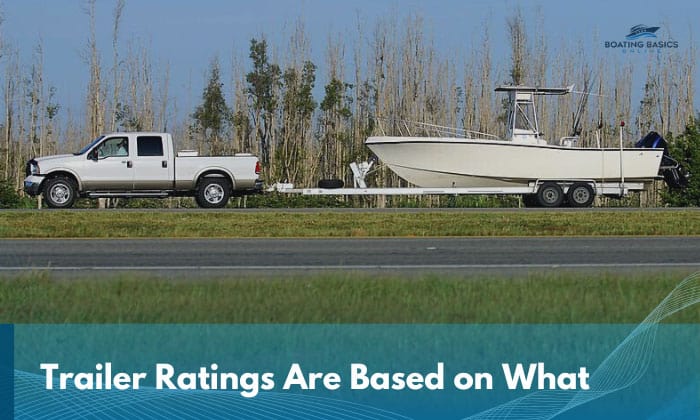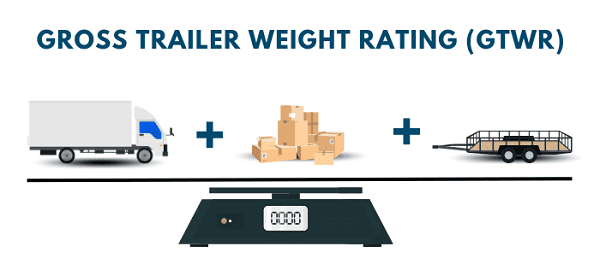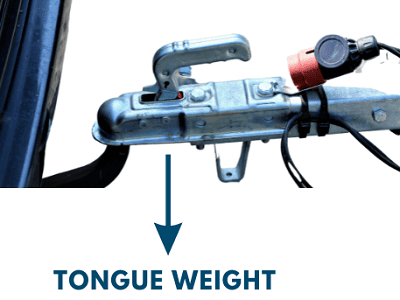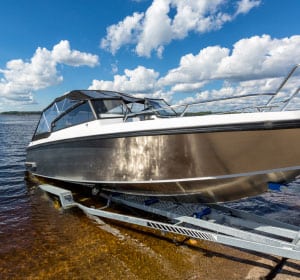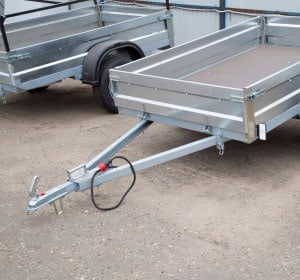Whether you’re studying for an exam or are just curious about the question, “Trailer ratings are based on what?”, you can get a comprehensive answer and detailed explanation here.
Trailers are mainly rated based on their gross trailer weight rating (GTWR), tongue weight, as well as the trailer’s length and width. Other factors that influence it are the boat’s weight, trailer type and capacity, and the towing vehicle’s capabilities.
Table of Contents
Evaluation Criteria for Trailer Ratings
Overall, the factors mentioned in the introduction are the yardsticks that manufacturers use when determining the boat trailer rating, which in turn, is reflected on its capacity plate as Gross Vehicular Weight Rating (GVWR).
The GVWR may be what the actual trailer rating is, but to those curious about “What are trailer ratings based on?”, look no further than the following.
1. Gross Trailer Weight Rating (GTWR)
This is the sum of the boat’s and trailer’s respective weights as well as all the cargo you’re carrying. It’s specified as the trailer’s Gross Trailer Weight Rating (GTWR) or Gross Trailer Weight (GTW).
Some prefer to remove the “R” or Rating to confirm that it’s not an actual rating and, of course, to not confuse it with the GVWR of the boat trailer.
The GVWR differs from the GTW in that it refers to the total weight the trailer can carry minus its empty weight. As such, the latter is often lower than and should not exceed the former.
The GTW and empty weight are not always indicated on the trailer. If that’s your case and you have the time, you can use a public weighing scale and measure it yourself. You just have to make sure that only the trailer, without any additional load, will be weighed to get the said measurements.
2. Tongue Weight
Tongue weight represents the vertical force exerted by the trailer’s tongue on the towing vehicle’s hitch or coupler. You need to calculate your exact trailer tongue weight range in pounds. Make sure you only add that much to avoid unnecessary swaying and keep your trailering smooth and safe every time.
That’s when knowing your trailer’s GTW becomes important. Because you only need to get 10% to 15% of the GTW to figure out your tongue weight. For example, if your GTW is 5,000 pounds (trailer weight and all the load of the cargo combined), then that leaves you with a tongue weight range of 500 to 750 pounds.
3. Trailer Length and Width
Length and width relate to boat trailer ratings by making sure that the boat will be securely accommodated and transported by the trailer.
Trailer manufacturers carefully measure the width to ensure the boat will fit properly within the trailer’s frame. If the boat exceeds that width, it won’t be properly supported and will become unstable during transportation. Of course, such a setup only invites danger.
Likewise, the trailer’s height relates to vertical clearance. The boat’s height on the trailer should be accounted for to avoid potentially hitting bridges and overpasses, which again brings about a risky situation.
Key Factors Influencing Trailer Ratings
These are the variables that directly impact the boat trailer weights and their respective trailer ratings.
1. Boat Weight
The fact that both the GTW and GVWR account for the boat’s weight clearly underscores its status as a crucial factor. Whatever your boat’s total load is, it shouldn’t exceed your trailer’s rating or be paired with a trailer that can safely carry its entire weight.
2. Trailer Type and Capacity
The type of trailer you’re using and its capacity influences ratings as well through the following facts:
- Boat trailers can be classified based on the type of boat they are designed for, and that already dictates their specific weight capacity.
- Double-axle trailers almost always have a higher maximum load limit (often three times more) than their single-axle counterparts.
The trailer capacity is readily displayed on the data plate. It relates more to the GAWR (Gross Axle Weight Rating), which can be used to calculate the GVWR. In a single-axle trailer, the GVWR and GAWR are the same.
The same can’t be said for a double-axle, though, as you’ll need to multiply the weight rating of each axle to get the GVWR. For example, if your GAWR is 1,500 pounds and you’re using a double-axle, the GVWR will likely be 3,000 pounds.
You also have to keep in mind that you have to deduct 12% from a double-axle trailer’s weight rating when calculating the load you’re going to put on it for added safety.
3. Towing Vehicle Capabilities
The towing vehicle is just as important in maintaining safe and efficient transportation. As such, its towing capacity should be matched with what the trailer is rated for.
Towing too much weight only leads to a difficult overall drive and can even put you and others on the road at needless risk.
Frequently Asked Questions
Importance of Boat Trailer Ratings?
Simply put, they provide you with the exact weights that you can only work with and adhere to every time you decide to go out trailering. They provide safety benchmarks that keep everyone on the road safe.
What happens if I exceed the trailer weight rating?
If you continue to ignore your trailer’s assigned weight rating, you’re essentially putting yourself in danger and aren’t doing your trailer and towing vehicle any good.
Also, chances are, the engine will require constant maintenance and repair due to the extra load you’re constantly putting on it. The trailer’s tires will also bear the brunt of the added weight, which only spells bad news.
It’s not for nothing that tire issues account for a majority of on-the-road boat accidents.
Can I upgrade the trailer to increase its capacity?
Yes, if the axle is the lowest-rated component, then feel free to add another one to boost the load limit. Moreover, you can also consider upgrading individual components such as the shock absorbers, lead springs, and coil springs.
Consider higher-quality materials for your axles, particularly those made of zinc or galvanized steel, to boost their reliability and longevity.
Are there different ratings for different types of boats?
Yes, as a reference, refer to a weight chart found online or any local resource you may come across. On the whole, jet ski and canoe trailers will have lower ratings than trailers designed to carry fishing vessels and larger watercraft in general.
Conclusion
Boat owners who ask, “Trailer ratings are based on what?” should always remember the myriad factors shared here and seek to know more about trailering because it will always be intertwined with their activities, one way or another.
Everything you put on your trailer relates to GTW, GVWR, tongue weight, and GAWR. These are the parameters that stand out the most in this discussion, which is only proven by their prominence in trailer data plates and discussions about trailering as a whole.

“My intention from the first day establishing Boating Basics Online is to provide as much help as possible for boaters who want to experience a first safe and convenient trip. So feel free to join us and share your beautiful journeys to the sea!”

